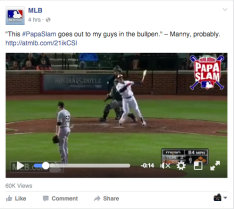Changes to Facebook branded content ‘a game-changer’ for sports and their sponsors

Major League Baseball is already using sponsors on Facebook
Changes to the way Facebook allows brands to post content will have a major impact on the way sports and sponsors are able to tap into each other’s communities, entertainment and sponsorship, claims Max Barnett, head of digital at Repucom.
The change in the content policy this week allows content such as videos and photos to include promotions, third party products and sponsor logos, all of which were banned under Facebook’s previous policy.
Max Barnett, head of digital at sport and entertainment market research company Repucom in the UK, told Mumbrella the change in policy will have a major impact on the way brands can tap into sports sponsorships.

Facebook’s new brand rules are a game changer, Repucom’s Max Barnett says
At the same time, Facebook wants brands to increase their use of the platform to premium and exclusive content.
“What they can now do is fish where the fish are,” Barnett told Mumbrella. “The key thing is that the content is authentic and not too sales-y.
“Such is the targeted capability of Facebook you can really make sure you are hitting the eyeballs that you need to. It’s very big news.
The implications of the change were already being demonstrated by leading rights holders such as the NBA, Major League Baseball and the NFL in the US.
“It wasn’t formal and there was a lot of nervousness around how this would work.
“The floodgates are going to open for a number of reasons, not least there is now a formal way in which a rights holder and a brand can work in the sponsorship space.
Barnett claims 80% of brands will have some sort of contact with digital or social during the purchase cycle and can now leverage their sponsorships throughout the customer journey.
He said that brands engaging through sports-focused Facebook pages would have to change their thinking in order to make the rule changes work in their favour.
“In a very simplistic way you have to think fan-first in the same way a brand thinks customer first. Is this going to enhance the customer experience? Is this going to improve the chances of conversion? And therefore if you apply the same logic to fans: is this good for fans, does this enhance the fans’ experience, advocacy and passion for the brand?
“If there is any doubt around whether this is going to drive down engagement rates or be overly sales-y then it’s just not worth doing.
Barnett warned that the challenge for marketers linking with sports through the sport’s own communities was the challenge of over-commercialising. “What’s the threshold? That’s challenge number one,” he said.
“Will fans turn around and where at the start of an agreement a brand and a rights-holder have agreed that the potential value is ‘X’ and in fact the tolerance to commercial content or over-branded content is actually significantly below, is a big challenge.
“Also the challenge is in changes to an algorithm long-term and likewise will Facebook start charging more if brands want to boost a post; will they start charging more and taking advantage and driving down organic reach even further.”
One example Barnett uses to show how brands will benefit by tapping into Facebook’s sporting audiences is the launch of team uniforms ahead of the next European football season.
“Kit launches are big, big events in a fan’s experience of digital. You will see brands taking full advantage of getting their logo front and centre and getting full integration into that story.
Barnett said Repucom very rarely provided recommendations that a brand should start its own Facebook page because of the challenges in attempting to build its own fan base.
“It enables brands to actually shut down their own brand site – for example, Chevrolet Football Fans site – and go full-on to their rights-holder agreement.”
With rights-holders now able to monetise their Facebook followers with sponsors through branded content, the rule change could result in a shift in how rights-holders use their own websites for exclusive and premium content.
“Any social guidelines I have seen from a leading rights-holder, the main objective is always to get the fan back on their platform to sign up for their CRM. Will this new policy change mean rights-holders instead push exclusive content on to Facebook and monetise there as opposed to on their platform?”
Simon Canning


Very interesting comments there from Max Barnett. The digital market is really evolving.